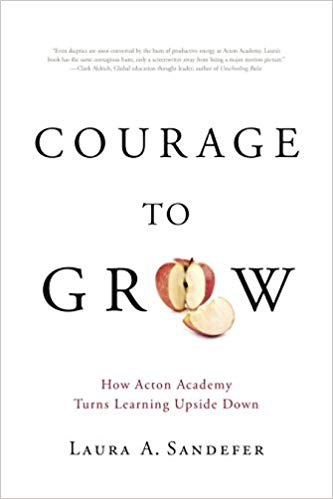
Book Name: Courage to Grow – How Acton Academy Turns Learning Upside Down
Progress track: Book 1 of “A new journey to find out the genius in my kids and learn to grow with them”
One sentence summary of the book: Laura shared her journey from building a home school just for her kids Sam and Charlie, to start the Acton Academy movement of upside down learning of finding genius in each kid.
My learnings
This book is awakening. It is easy to read and also so enjoyable. I always find that education is such a serious and intimidate topic, such as history. I got burned from the wrong way of learning history in school, so I was always afraid of it. “Courage to Grow” makes education seems so much fun and full of challenge.
Back in 2008 when Laura and her husband Jeff decided to started to home schooling their sons, they were not imagining that they will revolutionize kids learning today and have over 100 Acton Academy around the world!
So what makes Acton Academy unique?
The beliefs.
Each kid is genius. It is on us to find out their unique genius and cultivate them. Education should not force the children to fit in, but let the children learn by their uniqueness.
The principles.
There are three principles that are embedded in the name of Acton Academy
First, trust the children. It is a truth that the Founding Fathers knew – that children need guardrails, mentors, and legitimate authority, and they could be trusted with far more responsibility than most school administrators today could imagine.
Then, let them struggle. Parents who persistently fall on the side of intervening for their child, as opposed to supporting their child’s attempts to problem-solve, interfere with the most important task of childhood and adolescence; the development of a sense of self.
And always, seize the adventure. Questions, curiosity, trust, and struggle – these are the ultimate traits of a real adventure. Acton Academy was more a quest to discover one’s greatest gifts and the grand wonders of the world than a “school”.
Since the dawn of human civilization, the great myth affirming life as an adventure of self-discovery has struck souls of all ages. Joseph Campbell’s work brought the truth behind this narrative to life. George Lucas and Disney have used it well. From Star Wars to The Lion King and Beauty and the Beast, their stories hinge on the truth that even young children are drawn to transformative questions:
- Am I really a match for this task?
- Can I overcome the dangers?
- Who are my friends?
- Do I have the courage and the capacity for the challenge before me?
Each of us is just an ordinary persons; but if we’re willing to say yes to new experiences and keep moving forward, even when it’s hard, it hurts, and it includes failure, then we are – all of us – heroes on a journey.
A hero is not someone who has super power, but somebody who stand up on where he/she fell down.
Each child in Acton Academy needs to be on a Hero’s journey. At the beginning of a school year, they need to announce their journey to their tribe and write a contract to themselves.
The method and mentors that the methods are based on.
When I was working in SAP, I learned that in 21st century, innovation is not about creating something out of nowhere, but bringing something existing and creating a new and better way to solve a problem or reach a goal. This is exactly how Acton Academy is working. Laura and Jeff identified a list of mentors and modeled the learning after them.
- Socrates. Never answer a child’s question directly. Work with them to figure it out. That’s why there is no teacher, but guide in Acton Academy.
- Thomas Jefferson. Our third president, and the principal author of the Declaration of Independence, believed in learning by doing. “Do you want to know who you are?” he asked. “Don’t ask. Act! Action will delineate and define you.” At Acton Academy, the learnings is focused on doing, from the business fair for elementary school, to apprenticeship each year for middle and high school students.
- Maria Montessori. Acton Academy is heavily modeling after Montessori in the sense of student self-direction, circle time, mixed age classrooms with the maximum of 36 children, and adult’s role as guide but not teacher.
- Sugata Mitra. I was at TED event when Sugata received his 2013 TED Prize. In 1999, Sugata Mitra and his colleagues dug a hole in a wall bordering an urban slum in New Delhi, installed an Internet-connected PC and left it there, with a hidden camera filming the area. What they saw: kids from the slum playing with the computer and, in the process, learning how to use it — then teaching each other. These famed “Hole in the Wall” experiments demonstrated that, in the absence of supervision and formal teaching, children can teach themselves and each other — if they’re motivated by curiosity. Acton Academy embraces the minimally invasive education and also the latest technology driven learning.
- Sal Khan. Lots of Acton learning, especially math, are all directly online courses from Khan Academy. Sal Kahn is also Laura and Jeff’s mentor when starting Acton Academy.
- Laura and Jeff’s kids. It is our children who would teach us the most about learning.
Great quotes from the book.
One of my favorite lessons grew from answering a question posed to me by Socratic master teacher Steven Tomlinson, who asked “Would you rather be right or surprised?“
I began this journey wanting to be right. I wanted formulas, answers, evidence. I even wanted report cards, test scores, and grades – some authority figure to tell me how I was doing.
I now am grateful to be surprised. With surprise comes a sense of wonder, a sense of risk and flying off into the unknown, ready to self-correct when needed. Embracing school as an experiment has meant we are all learners at Acton; there are no experts among us. There is a playful and fun yet deeply serious ethos that surrounds us each day, because we are bound by principles and purpose. We can be free to explore with a sense of stability in our questioning and questing.
“Struggle will teach you the best things about yourself.”
If children are given room to struggle and to figure things out on their own, and if they have support from a mentor, peer, or guide who knows them well and holds them accountable, they will learn more than we can imagine.
How can I make this kind of room? I must remember to step back. Wait to be surprised instead of right. Only then will I discover the wonderment of daily life.
It was the children who taught me how to be a parent. They were the ones who had the courage to grow
Here is the next book I am going to read. “The gifts of Imperfection“.

